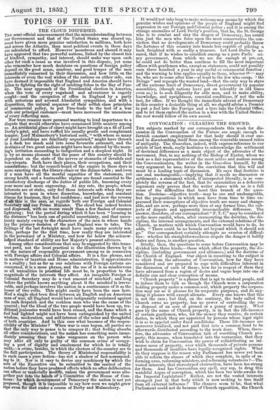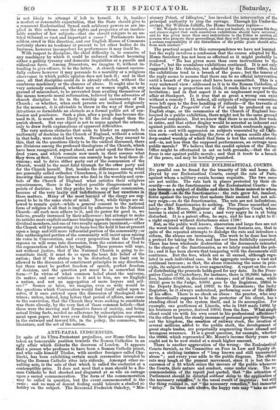CONVOCATION: CLEARING THE GROUND.
THE subjects marked by our correspondents this week for dis- cussion in the Convocation of the Future are ample enough to furnish constant employment for that body should it ever suc- ceed in disentombiself from among the venerable unused relies of antiquity. The Guardian, ndeed, with express reference to our article of last week, coyly hesitates to acknowledge the settlement of doctrinal differences as a main object of the advocates of the movement. But, to say nothing of the Bishop of Exeter, whom we took as a fair representative of the most active and zealous among the Convocationists, the writer in the Guardian himself, by the very argument he uses, forces the conviction that this will and must be a leading topic of discussion. He says that doctrine is one and unchangeable,—implying that it needs no discussion or settlement; a statement which, if interpreted literally, is so coin- pktely the reverse of the fact, that its enunciation as a defensive argument only proves that the writer shares with us in a full sense of the difficulties that beset this branch of the ques- tion. Doctrine—objective truth—may be one and unchangeable, but the propositions in which men have from time to time ex- presssed their conceptions of objective truth are many and change- able, and are now, perhaps more than at any former time, the sub- jects of dispute and apparently kreconcileable difference. The answer, therefore, of our correspondent "F. T. C." may be considered as the more candid, when, after enumerating the doctrine, the dis- cipline the internal arrangements, and the external relations of the Church, as matters with which Convocation would have to do, he adds, "There could be no bounds set beyond which it should not go." Our correspondent certainly attempts no evasion of difficul- ties: whether his straightforwardness dispels the danger it boldly states and faces, is another question. Briefly, then the questions to come before Convocation may be divided into three kinds,—those which affect the property, the dis- cipline, (including government and alliances,). and the doctrine of the Church of England. Our object in recurring to the subject is to elicit from the advocates of Convocation, how far they have considered and are prepared to cope with difficulties inherent in the discussion of each of these ; how far in respect of them they have advanced from a region of desire and vague hope into one of definite aim and clear conception of means. "Church property" is a phrase that is apt to mislead people, and to induce them to talk as though the Church were a corporation holding property under a common seal, which property the corpora- tion may use as it pleases for its corporate purposes, and do any- thing it pleases with except alienate. Every one knows that this is not the case; but that, on the contrary, the body called the Church owns no property, has no power of controlling the use or disposal of an acre of ground or a penny of money. What goes by the name of Church property, is in fact the life-incomes of certain gentlemen, who, for the money they receive, do certain duties, to which they are appointed by persons whose legal right it is so to appoint under fixed conditions. These life-incomes are moreover localized, and not paid first into a common fond to be afterwards distributed according to the work done. When, there- fore, the advocates of Convocation talk of resettling Church pro- perty, this means, when translated into the vernacular, that they wish to claim for Convocation the power of redistributing an im- mense mass of property., over which thousands of private persons and thousands of localities have legally-recognized rights. What do they suppose is the reason why Parliament has never yet been able to reform the abuses of which they complain, in spite of re- forming feras, reforming ministers, and reforming volunteers P—The vested interests, that stereotyped obstruction, have been too strong for them. And has Convocation any spell, any sop, to drug this watchfuls of corruption, which has been too wide-awake for the ImperfrinLegislature? Bather, are not the vested interests strongest just in that body which is now seeking to free itself from all external influence ? The chances seem to be, that what Parliament could not do because of Church opposition, the Church is not likely to attempt if left to herself. Is it, besides, a modest or reasonable expectation, that the State should give to a renascent Ecclesiastical Synod such arbitrary powers as are im- 'Vied in this scheme over the rights and properties, of an incalcu- lable number of her subjects—that she should relegate to an un- tried tribunal so vast and important a cause ? Parliaments have seldom erred in this direction, and our English House of Commons certainly shows no tendency at present to let other bodies do its business, however incompetent for performance it may itself be. With respect to discipline, the chief difficulty is to conceive of any machinery by which it could be enforced without becoming either a galling tyranny and domestic inquisition or a puerile and ridiculous farce. Among Dissenters, we imagine it, without in- tending to give offence, to be the latter. A church cannot success- fully enforce however it may persuade to a morality or a religious observance in which public opinion does not back it ; and in that case, all that discipline could do is already effected, without the cumbrous machinery or the chances of abuse. It ought also to be very seriously considered, whether men or women ought, on any ground of misconduct, to be prevented from availing themselves of the means towards moral reformation, believed by the advocates of church discipline to lie in the worship and sacraments of the Church ; or whether, when such persons are inclined religiously for the moment, it is advisable to throw in the way of their good intentions so formidable an obstacle as a formal public act of con- fession and penitence. Such a plan, after a people has become dis- used to it, is much more likely to fill the rival chapel than the parish church. But our object is not to argue against the scheme, only to draw forth explanations of apparent difficulties.
The very serious obstacles that seem to hinder an approach to uniformity of doctrine in the Church of England, without a schism in that body, were stated last week. Broadly put, they amount to this, that on the questions likely to be the earliest discussed, there are divisions among the professed theologians of the Church, which have been recognized, argued about, and acted upoit for three hun- dred years, and which remain now much in their essence what they were at first. Convocation can scarcely hope to heal those di- visions; and to drive either party out of the communion of the Church, would be the most fatal triumph for the other party and for the Church herself. But, besides the differences among what are generally called orthodox Churchmen, it is impossible to avoid knowing that among the laymen who find in the worship and sym- bols of the Church of England what satisfies their religious Consciousness there is the widest possible disagreement as to points of doctrine ; but they prefer her to any other communion, because of the very laxity and indefiniteness of her exactions in these matters. Many of the most learned of the clergy are sup- posed to be in the same state of mind. Now, while things are al- lowed to remain quiet—while a general consent to the national i
form of religion s all that is implied by adherence to the National Church—all such men adhere to it, and its power for good is, we believe, greatly increased by their adherence : but attempt to make its articles more explicit andmore binding upon the consciences of in- dividual members, and one of two results appears imminent, —either the Church will by narrowing its basis lose the hold it has at present upon a large and still more influential portion of the community; or this untheological portion of the community will insist upon raising its voice in Convocation and every proposition that the Church reposes on will come into discussion, from the existence of God to the regeneration of infants by baptism. These persons will urge, not without justice, that if the National Church is going to re- constitute itself, it must do so upon the bona fide belief of the nation; that if the status is to be disturbed, no limit can be allowed to the discussion of constituent principles in any direction, but there must be perfect freedom of speech, perfect freedom of decision, and the question put must be in somewhat this form—" In virtue of what common belief about the universe, its maker, and our relations to it and to him, are we English a nation and not an aggregation of mere buyers and sell- ers?" nation, or later, we imagine, even so wide would be the questions which Convocation would find itself called upon to solve, if it once entered upon the discussion of theological. doc- trines; unless, indeed, long before that period of affairs, men came to the conviction, that the Church they were seeking to constitute was there already, by the very fact of those common beliefs—that these were the moving and formative forces of society, and being actual living facts, needed no adherence by subscription nor state- ment upon paper, but were ever finding their genuine expression in the outward and inward life, in the policy, the commerce, the literature, and the art of the nation.



























 Previous page
Previous page